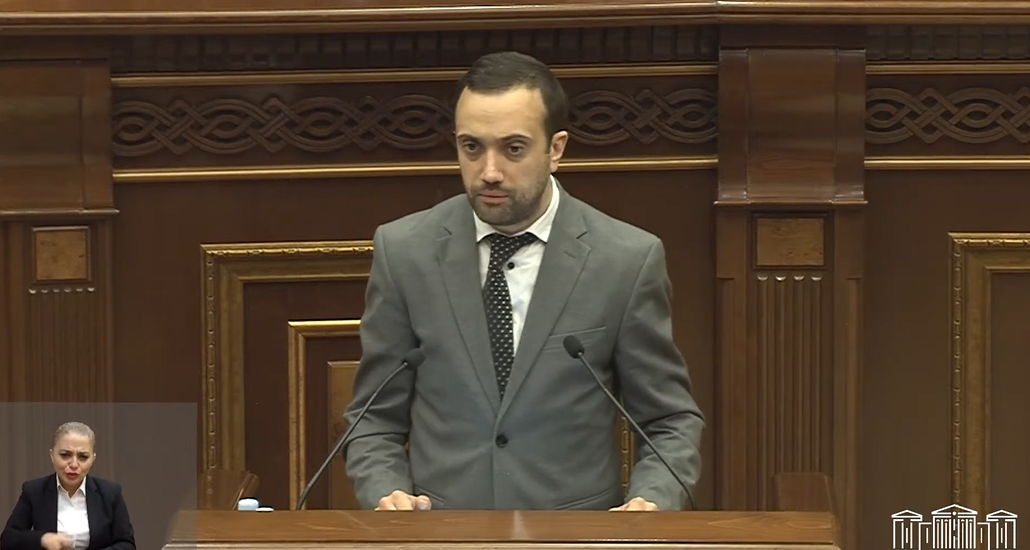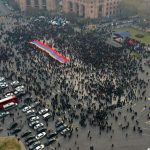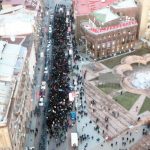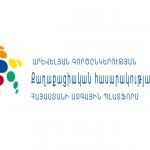- 10 April, 2025
- Announcements

Speech by Daniel Ioannisyan, Programs Coordinator of the Union of Informed Citizens NGO, at the parliamentary hearings on “Road Traffic Safety in the Republic of Armenia.”
“Dear colleagues, dear deputies of the National Assembly, dear Mr. Deputy Prime Minister,
In the context of traffic safety, I would like to talk about the relations between the state and citizens, and relations specifically in this context, which, I believe, are an integral part, because, indeed, the issue of numerous regulations is extensively debated. But what is important in this topic is the ideological aspect and the issue of relations between the state and citizens in this context.
We at the Union of Informed Citizens have identified a number of issues that I would like to address today. First is the issue of the lawful behavior of law enforcement officers. In particular, we have singled out several aspects here. The first concerns the so-called operational license plates and “special tickets” which are sometimes abused and sometimes, in fact, law enforcement officers commit traffic violations that other citizens don’t or, if they do, are subject to administrative liability, and this, I believe, serves as a bad example for the public.
The other issue is the situation related to lawfulness near a number of law enforcement buildings and structures, and this applies to various law enforcement bodies, ranging from the Prosecutor’s Office to investigative bodies, the National Security Service, the police… we often see that in the areas adjacent to these buildings, vehicles are parked on the sidewalks and in different places, and this, I think, also sets a very bad role model for citizens of what law enforcement should be like in general.
The third issue concerns the disciplinary proceedings against police officers of the Ministry of Internal Affairs for violating traffic rules in the performance of their duties, which existed in the past. In other words, disciplinary proceedings were initiated against officers in the past, and at least it was determined whether the officer violated the traffic rule out of official necessity or not, but presently, in recent years, the initiation of all proceedings is being universally rejected, and in general, the Internal Security and Anti-Corruption Department does not even discuss whether this violation was committed out of official necessity or not.
And, of course, the last issue here concerns nepotism, which nonetheless exists, and we often witness that the administrative action against various people in power, including relatives of law enforcement officers and high-ranking officials, differs from that of other citizens. There is a lot of information on this matter, and in addition, recently information has surfaced related to the overturn of violations committed by relatives of high-ranking police officers and high-ranking officials that were reported, where we see that sometimes these overturns are, to put it mildly, not very well-grounded.
The next group of issues concerns the lack of a unified approach to administrative action. We at the Union of Informed Citizens have studied and noted that there is almost no unified approach in the Police Patrol Service, and the state in some sense becomes unpredictable for the citizen. It is notable, for example, that there are significant discrepancies in the statistics of the four battalions of the Yerevan City Patrol Service Regiment. In the battalions the commanders of which were previously traffic police officers, for instance, the number of road traffic violations reported is much higher, but in those battalions where the servicemen were previously non-traffic police officers, the rate of solved crimes is much higher, the reported traffic violations are lower, and the rate of reported traffic violations varies by 40 percent across battalions despite the fact that these battalions perform equal share of service. And this again attests to the fact that there is no unified approach even in the Yerevan City Regiment.
This holds true for the regional battalions as well. We see that a number of indicators vary significantly across the regional battalions. For example, if we look at the statistics of tickets overturned by the patrol itself, which should be in equal share, we can see that there are regions where two percent are overturned, while in other regions it is nine percent. And this also attests to the fact that there is no unified approach.
Another issue is that patrols sometimes ignore drivers who commit violations due to their involvement in functions not provided for by the regulations. For instance, when a patrol is involved in escorting and must provide escort services, there may be “all-permissiveness” in their presence, they will have to not react, but stand still, and this leaves a very bad impression on on-lookers that there is impunity in Armenia again… such an impression is created, which is quite problematic and, of course, generally affects driving discipline.
And also the last issue of this group is that patrols often, excuse my vocabulary, are not in the mood of going after offenders to hold them administratively liable, especially if they feel that this is some, roughly speaking, powerful person who may create some problems for them. This, again, varies across battalions. There are battalion commanders who create a different environment, but there are battalion commanders who do not create an environment or impression among their subordinates that they have their subordinates’ backs. And this is also a significant problem.
This issue should also be resolved by the Patrol Service Monitoring, which should properly monitor and go after those patrols who see but do nothing about traffic violations. Unfortunately, we see that the Monitoring Service does not perform its duties properly.
Also in terms of enforcement there are many examples under this last issue, for example, in the area of winter tires. We all saw it, it was widely covered that the government made a change to the Annex to Decision 955 of 2007, introduced regulations related to winter tires, but when we look at the statistics of how many drivers in the Republic of Armenia were subject to administrative fines for driving with non-winter tires or violating these regulations during a certain period of time, we see that the enforcement of the government decision has almost not been carried out.
In addition, we have identified a number of legislative issues. In fact, there are many legislative issues, and I do not mean that this is the entire list, but I will focus on a few of those.
One is that the legislation that provides punitive mechanisms, i.e. the criminal legislation and the Code of Administrative Offenses, in fact, encourage people not to receive a driving license because under the current regulations if you do not obtain a driving license, you cannot be held criminally liable for driving a car being disqualified from a driving license. You can drive without obtaining a driving license and in case of being caught, you get fined, you pay the fine, and continue to drive. And the state does not have any serious leverage against drivers with such behavior, whereas for drivers who have been disqualified from their driving license, who have received a drivings license but have been disqualified from it, that is, have demonstrated relatively more lawful behavior, it has a more serious set of tools.
This issue was discussed during the previous hearings, and I believe that amendments to the criminal legislation should nonetheless be made.
Another issue is that a number of actions that are already considered misdemeanors in different countries around the world are still not punishable in any way in Armenia. For instance, dangerous driving, which is not a separate action defined by the Code of Administrative Offenses of Armenia, but in many countries around the world it is considered not only a misdemeanor, but also one of the grossest traffic violations. In other words, dangerous driving is considered a much more serious violation than non-compliance with the traffic light. Meanwhile, in Armenia it is not a punishable action in any way, which, I think, should also be amended. Here, of course, lawyers can argue that there may be problems with interpretations and precise enforcement, but it is better for us to have problems with precise enforcement, we may have a high rate of tickets overturned in court, but nevertheless, at least it will be clear for drivers that dangerous driving, in popular parlance, “playing checkers” is a punishable action.
Thank you.”




